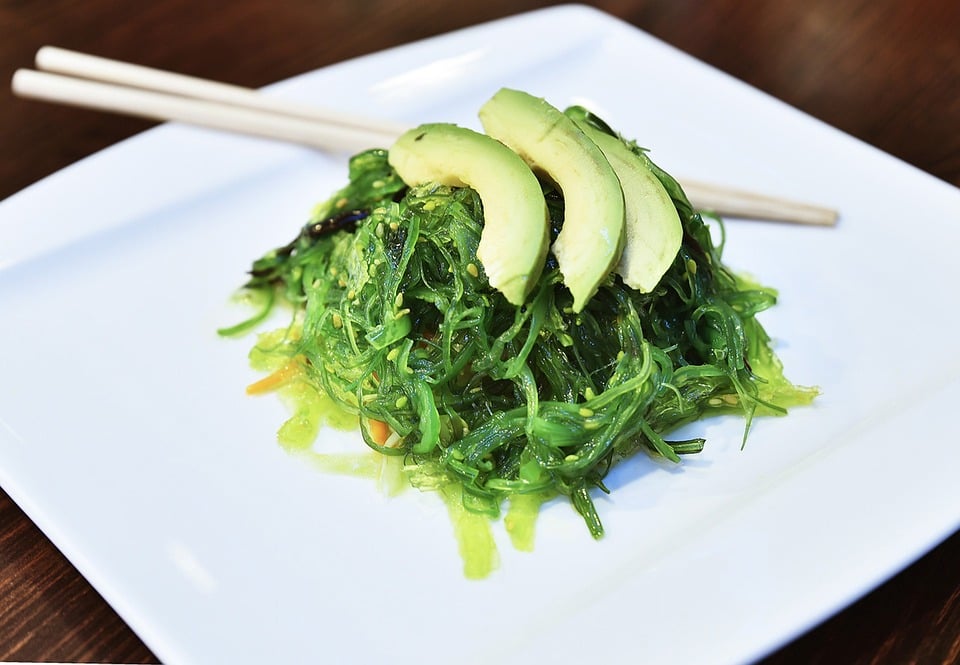- This post contains affiliate links. Read more here.
- Not a substitute for professional veterinary help.
From soups to salads to sushi, humans love to eat seaweed. And who can blame them? Seaweed has nutritional benefits like being rich in iron, magnesium, iodine, and of course, omega-3 fatty acids. But can your dog join in when you enjoy this ocean vegetable? The same nutrients that make seaweed healthy for humans can also benefit dogs, promoting healthier skin and fur. So naturally, seaweed can be just as beneficial for your dog, with a few exceptions.
Can my dog eat kelp or nori?
Kelp and nori are both considered seaweed, though they look quite different. Both are safe for dogs, as long as they aren’t seasoned with additional salt or other spices such as garlic. In fact, some sea veggie loving dog parents report that small pieces of nori, the unseasoned seaweed sheets you wrap sushi in, are great training treats. Kelp, especially the varieties that live in the deep ocean, is also used in many seaweed supplements for pet food. The only exception for kelp is to avoid the kind that grows along the coast, especially those found near US beaches. Pollutants can be absorbed by those varieties, making them a less than healthy treat for your dog.
All seaweed strains are considered edible for dogs, but you do want to be careful how you feed it to your dog. Processed seaweed such as nori is fine in small amounts, but most sources recommend ground seaweed as the preferred way to add it to your dog’s diet. Feeding your dog unprocessed strips of seaweed could cause a blockage in their intestines, so care should be taken when adding this vitamin powerhouse to your dog’s food.
Quantity is also something to consider. With most things, too much of a good thing can turn dangerous for your dog. If you’re concerned about the amount of seaweed to feed your dog, or are considering adding seaweed to your dog’s diet to improve any medical conditions, consult your vet. They’ll know what amounts are healthy, and can advise if the iodine in seaweed will interact negatively with any medications your dog may be on.
Dangers of wild seaweed on the beach
We all know that dogs love to eat whatever they find, and there’s nothing quite like the joy of watching a dog run free down the beach. When they start eating things they find on the beach, however, that’s when things start to get dangerous. In addition to the possible pollutants in shore seaweed mentioned above, eating seaweed off the beach can also lead to salt poisoning in dogs. That’s not to mention the possible critter stowaways that may also be lurking on beach seaweed. Jellyfish may also be mixed in with seaweed, and even dead ones can cause an allergic reaction if your dog accidentally eats them.
Dried seaweed on the beach offers another danger. Once eaten, it can expand in your dog’s intestines, creating a blockage with possibly deadly results. It’s recommended to contact your veterinarian immediately if you believe your dog has ingested dried wild seaweed. The effects can escalate from mild to deadly in a matter of hours. Keep a close watch on your pet for signs of wild seaweed poisoning. It’s also a good idea to keep your dog on a leash or close to you when exploring areas that may have dry seaweed or other dangerous edibles, such as the high tide line.
Symptoms to look out for:
- Vomiting
- Diarrhea
- Loss of Appetite
Adding seaweed into your dog’s life
A sprinkle of seaweed supplement on top of your dog’s food is the easiest way to add seaweed to your dog’s diet. Even though it may taste salty, seaweed is surprisingly low in sodium, making it a tasty treat that’s also good for your dog. The only thing you need to be careful of is wild seaweed, and being mindful of the amount of amount of seaweed you’re feeding your dog.
Of course, when adding new foods and supplements to your pet’s diet, it is good to monitor their reactions, in terms of stool appearance, behavior, energy levels, and overall disposition, and consult your vet if you’re trying to treat a specific condition, such as dry skin or fur loss. They could have even more suggestions on how to add this vitamin powerhouse to your dog’s life.
For More Information
We have many different articles on which types of food that may or may not be safe for your dog to indulge in. Browse through our directory page with all the “Can My Dog Have” articles here.
You may also be interested in our Dehydrated Veggie Treats for Dogs recipe for more healthy treat ideas.





